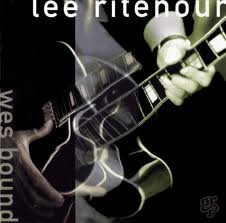
Daily Dose Of Jazz…
Lee Mack Ritenour was born January 11, 1952 in Los Angeles, California and at the age of eight he started playing guitar. Four years later decided on a career in music and by 16 he was playing on his first recording session with the Mamas & the Papas. He developed a love for jazz, influenced by guitarist Wes Montgomery. A year later he worked with Lena Horne and Tony Bennett, then studied classical guitar at the University of Southern California.
His solo career began with his debut album First Course in 1976 which was a jazz-funk sound of the 1970s. Lee followed with Captain Fingers, The Captain’s Journey, and Feel the Night to close out the decade. The Eighties saw Ritenour adding pop elements to his music, which got him charting so he stayed the course. During this period he added vocals to his music, recruiting such artists as Djavan, Bill Champlin, Eric Tagg, Patti Austin, Ivan Lins, Phil Perry, João Bosco, Kate Markowitz, Maxi Priest, Lisa Fischer and Michael McDonald.
In 1988, his Brazilian influence came to the forefront on Festival, an album featuring his work on nylon-string guitar. He changed direction with his straight-ahead jazz album Stolen Moments which he recorded with saxophonist Ernie Watts, pianist Alan Broadbent, bassist John Patitucci, and drummer Harvey Mason.
Then 1991 had Ritenour and keyboardist Bob James forming the group Fourplay, where he stayed until 1997. He released the career retrospective Overtime in 2005. Smoke n’ Mirrors came out the next year with the debut of his thirteen-year-old son, Wesley, on drums.
Guitarist Lee Ritenour has recorded 34 albums, garnered 16 Grammy nominations, received one Grammy Award and has been a judge for the Independent Music Awards. He continues to explore, record, compose and perform.
More Posts: bandleader,guitar,history,instrumental,jazz,music
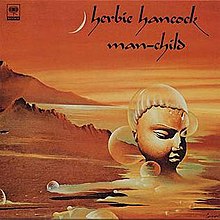
The Quarantined Jazz Voyager
This week the ever vigilant Jazz Voyager is watching this new version of the virus creeping back to once again exploit humanity’s complacency relative to the collective health. People are still dying, maybe not at the rate over the past two years but dying. So in the spirit of staying healthy, I am selecting a classic funk~fusion album from the shelves and placing it on the turntable to take a renewed listen. This week it is the album Man-Child by Herbie Hankcock.
It is the fifteenth studio album by the jazz pianist. Recorded between 1974 and 1975, it was released on August 22, 1975 by Columbia Records, it was the final studio album to feature The Headhunters. The album was produced by David Rubinson and Hancock, and was recorded at Wally Heider Studios and Funky Features in San Francisco, California as well as Village Recorders and Crystal Studios in Los Angeles, California.
Departing from the music of his early career, Herbie gives us one of his most funk-influenced albums. Utilizing more funk based rhythms around the hi-hat, and snare drum, the tracks are characterized by short, repeated riffs by both the rhythm section, horns accompaniment, and bass lines. With less improvisation, more repetition of riffs along with brief solos, he re-introduces the electric guitar to this new sound.
The core group of The Headhunters was Paul Jackson, Bill Summers, Harvey Mason, Bennie Maupin, and Mike Clark (who replaced Harvey Mason post-1974). Hancock had toured and recorded with them for the previous three years. This was their final album as a group.
Tracks | 45:17- Hang Up your Hang Ups (Hancock, Melvin Ragin, Paul Jackson) ~ 7:29
- Sun Touch ~ 5:12
- The Traitor (Hancock, Ragin, Louis Johnson, Wayne Shorter) ~ 9:38
- Bubbles (Hancock, Ragin) ~ 9:03
- Steppin’ In It ~ 8:42
- Heartbeat (Hancock, Ragin, Jackson) ~ 5.16
- Herbie Hancock ~ piano, keyboards
- Bud Brisbois ~ trumpet
- Jay DaVersa ~ trumpet
- Garnett Brown ~ trombone
- Dick Hyde ~ trombone, tuba
- Wayne Shorter ~ alto and soprano saxophones
- Bennie Maupin ~ soprano and tenor saxophones, bass clarinet, alto and bass flutes, saxello, percussion
- Jim Horn ~ flute, saxophone
- Ernie Watts ~ flute, saxophone
- Dewayne McKnight, David T. Walker ~ guitar
- Wah Wah Watson ~ synthesizer, voice bag, guitar
- Henry E. Davis ~ bass guitar
- Paul Jackson ~ bass guitar
- Louis Johnson ~ bass guitar
- Mike Clark ~ drums
- James Gadson ~ drums
- Harvey Mason ~ drums
- Stevie Wonder ~ harmonica
- Bill Summers ~ percussion
More Posts: adventure,album,club,genius,jazz,museum,music,piano,preserving,restaurant,travel
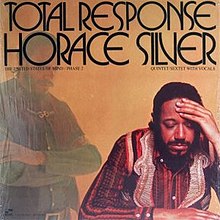
The Quarantined Jazz Voyager
Reading the history of humanity, evidence proves that bad decisions are not relegated to bad people but are also made by good people. If taking off a face mask is your back to normal, in my opinion, you’re not reaching high enough and the brass ring has passed you by. Legislators and the media are confounding the public with different opinions, playing the he said she said game. The collusion is abomidable and most are buying into it. Remain vigilant, protect yourself, remain healthy.
This week I have chosen Total Response (subtitled The United States of Mind Phase 2) for our listening pleasure. It is an album by pianist Horace Silver that was recorded on two separate dates, November 15, 1970 (tracks 1,2,6,9) and January 29, 1971 (tracks 3,4,5,7,8). It was recorded at Van Gelder Studios in Englewood Cliffs, New Jersey, released in April 1972 on Blue Note Records, and produced by Francis Wolff and George Butler.
In 2004, it was included as the second of a trilogy of albums compiled on CD as The United States of Mind. Track List | 45:11 All compositions by Horace Silver
- Acid, Pot or Pills ~ 4:26
- What Kind of Animal Am I ~ 3:38
- Won’t You Open up Your Senses ~ 3:56
- I’ve Had a Little Talk ~ 3:46
- Soul Searching ~ 4:15
- Big Business ~ 5:22
- I’m Aware of the Animals Within Me ~ 3:45
- Old Mother Nature Calls ~ 6:17
- Total Response ~ 5:22
- Horace Silver – electric piano
- Cecil Bridgewater – trumpet, flugelhorn
- Harold Vick – tenor saxophone
- Richie Resnicoff – guitar
- Bob Cranshaw – electric bass
- Mickey Roker – drums
- Salome Bey (1, 2, 5-7, 9), Andy Bey (3, 4, 8) – vocals
More Posts: adventure,album,club,genius,jazz,museum,music,piano,preserving,restaurant,travel
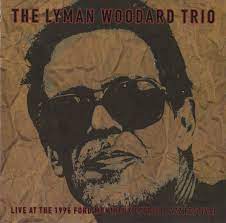
Daily Dose Of Jazz…
Lyman Woodard was born on March 3, 1942 in Owosso, Michigan. He started his musical career with a trio with drummer Melvin Davis and guitarist Dennis Coffey. They recorded the album Hair And Thangs that was released under Coffey’s name, however a single with It’s Your Thing and River Rouge was released under the name of Dennis Coffey and the Lyman Woodard Trio.
From the late 1960s, Woodard recorded with Motown acts, and served as musical director for Martha and the Vandellas. Establishing the jazz~funk band, the Lyman Woodard Organization in 1975 recorded Saturday Night Special, and in 1979, he recorded Don’t Stop The Groove, for the Corridor label. His 1987 recording, Dedicacion, featured violinist Regina Carter.
In March 2009, Wax Poetics Records reissued a limited pressing of his Saturday Night Special as a double LP on 180-gram vinyl.
Organist Lyman Woodard, who was based in Detroit, Michigan and was known for his ability to fuse Latin and Afro~Cuban inspired rhythms, transitioned on February 25, 2009 in his hometown of Owosso.
More Posts: bandleader,history,instrumental,jazz,music,organ,piano

Daily Dose Of Jazz…
Alain Mion was born of French extraction on January 14, 1947 in Casablanca, Morocco but was raised in Paris, France.Influenced by Bobby Timmons, Ray Charles and Les McCann, his style varies between jazz, soul jazz and funky music. By the time he was 19 he formed his own trio and performed at the Blue Note. This subsequently led to him gigging at various festivals with Hank Mobley and Philly Joe Jones.
1974 Alain created the jazz funk group Cortex and recorded a dozen albums before embarking upon a career under his own name in 1982, recording to date eleven albums, such as Pheno-Men, Alain Mion in New York recorded with David Binney and Marc Johnson, and Some Soul Food recorded in Stockholm, Sweden with Patrik Boman and Ronnie Gardiner.
In 2008, he emerged with a new group, Alain Mion FunKey Combo with drums, bass and a saxophone section consisting of Italian and French musicians. He reinvented his new group Alain Mion & The New Cortex with the singer Adeline de Lépinay reprising the role originally performed by Mireille Dalbray on the Troupeau Bleu album.
In the United States, Alain Mion and Cortex’s songs have been sampled by several hip-hop artists including but not limited to Madlib, Fat Joe, DJ Day, MF DOOM, Wiz Khalifa, Curren$y, Mellowhype, Tyler The Creator, Rick Ross, and Lupe Fiasco.
Pianist, composer, arranger, and vocalist Alain Mion continues his exploration of the jazz idiom.
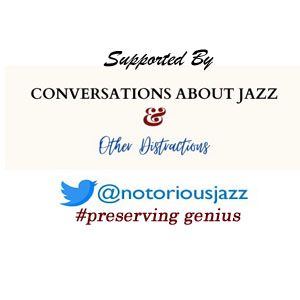
More Posts: arranger,bandleader,composer,history,instrumental,jazz,music,piano,vocal



